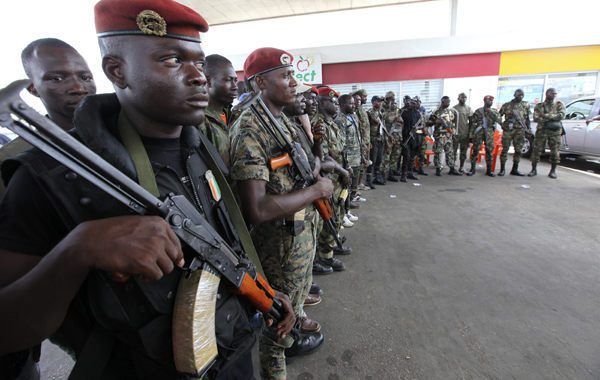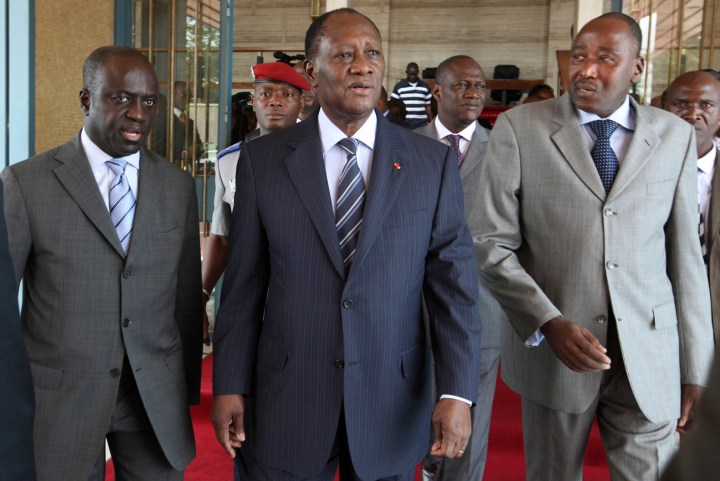It has been just less than three weeks since Laurent Gbagbo was forcibly evicted from Côte d’Ivoire's presidential palace. President Alassane Ouattara now faces the really difficult task in the West African country of instilling peace and uniting a bitterly divided nation. By SIPHO HLONGWANE.
The eyes of the world may have shifted back to Libya, Yemen and Syria, where conflicts still rage, but the most difficult period for Côte d’Ivoire still lies ahead. Laurent Gbagbo may be imprisoned, Alassane Ouattara may now be ruling his country and the majority of fighting may have stopped, but the battle for the country is still ahead. Ouattara now needs to repair and restart Côte d’Ivoire’s economy, provide for the millions of displaced refugees who will be coming back to their homes in trickles and find a lasting solution to the country’s divisive problems still plaguing it.
But first, the troops and militias fighting for Ouattara need to convince the opposing forces that they have indeed lost the war. Doing so often means continued violence. The Forces Républicaines de Côte d’Ivoire, the main army fighting for Ouattara is still meeting pockets of resistance in Abidjan, the site of Gbagbo’s last stand, even though their president was arrested on 11 April. Bruno Dogbo Ble, the commander of Gbagbo’s Republican Guard was arrested on 19 April and the army dispersed; a signal that Gbagbo had truly lost the conflict.
Not everyone is laying down arms, though. The last remaining militias still resisting the FRCI are mostly those that retreated to Abidjan to resist the onslaught from the north inside Côte d’Ivoire’s economic capital. The commander of one such group, Ibrahim Coulibaly was killed on 27 April after he opened fire on government troops trying to dislodge him from his hideout. According to the defence ministry, Coulibaly was holding an entire family hostage. The FRCI raid was part of an offensive aimed at ridding the Abobo district of the “invisible commandos” that have terrorised the area’s northern population. Coulibaly had ignored an order by Ouattara for all militias to lay down their weapons. The rebel commander was always a loose cannon and a major security threat, having claimed he was responsible for an attempted coup in 2002 to topple Gbagbo.
Earlier, the government shut down the University of Cocody’s campuses so they could go in and remove the militias clustered there. The whereabouts of Charles Blé Goudé, Gbagbo’s “street general” and Abidjan’s most powerful militia leader, are still a mystery. It had been reported on 16 April that he had been arrested, but that turned out to be false. Blé Goudé would have good reason to flee or hide – he openly incited violence against foreigners and supporters of Ouattara.

Photo: Soldiers of pro-Ouattara FRCI (Ivorian army) stand with their weapons in Yopougon, an area within Abidjan, April 28, 2011. REUTERS/Luc Gnago.
In other areas of Côte d’Ivoire, it is back to business. Souleymane Diarrassouba, vice president of the Ivorian Banking Professionals’ Association told Reuters the regional bank Banque Centrale des Etats de l’Afrique de l’Ouest was reopening in Côte d’Ivoire and “it has made all arrangements to supply the banks with bills”. Private banks including Societe General and Standard Chartered were set to reopen on Thursday. Trade in cocoa has also resumed.
However, a humanitarian crisis still looms. According to UN refugee agency’s Fatoumata Lejeune-Kaba, they can only start assessing the extent of the humanitarian damage now that the majority of the fighting has subsided. She told Voice of America, “It seems like the worst of the fighting is over in Cote d’Ivoire, but unfortunately, the humanitarian situation, the security situation, are still fragile. And I think that now that we are able to be fully operational again we will be seeing the extent of the humanitarian crisis.
“In the west there were lots of people who were hiding in the bush. They’re just starting to come out now. We have been sending missions to areas where there’s been very little humanitarian presence for months. And we are discovering people that are really, really in terrible conditions,” Lejeune-Kaba said.
The UNHCR estimates that a million people fled the violence in Abidjan with a further 200,000 in the west of the country, which saw some of the worst atrocities of the war.
Amnesty International is already in the west of Côte d’Ivoire to probe mass killings there, allegedly at the hands of pro-Ouattara forces. Ouattara himself condemned the killings, saying at his first press conference following Gbagbo’s arrest he would be in touch with the ICC so the court could begin investigations.
Ouattara’s government is laying the preliminary work to put Gbagbo and his aides on trial. There had been fears Ouattara would have a difficult task persuading the Ivoirians who didn’t vote for him to support his new government. The support of the FRCI was crucial as without it Gbagbo could have been in power still. Ouattara must now chart a path that all can accept without the threat of the FRCI knocking their doors down. A thorough investigation into atrocities and fair trials of those responsible will go a long way towards healing the divisions that have plagued Côte d’Ivoire for a decade. DM
Read more:
- Banks to resume Ivory Coast operations Thursday in Wall Street Journal;
- Many Ivory Coast displaced still lack food, water shelter in Voice of America;
- Probe into Ivory Coast’s mass killings in Al Jazeera;
- Ivory Coast cocoa trade, banking poised to restart in Reuters;
- I. Coast embarks on daunting security purge in AFP hosted by Google News;
- African Union reinstates Ivory Coast in Voice of America.
Photo: Ivory Coast’s President Alassane Ouattara (C) walks in between Marcel Amon Tano (L), Ouattara’s chief of staff, and General-Secretary Amadou Gon during Ouattara’s first visit to the presidential palace in Abidjan April 28, 2011. The visit came two weeks after former president Laurent Gbagbo was ousted from power by forces loyal to Ouattara, backed by French and U.N. troops who were deployed to help end a four-month power struggle in which more than 1,500 were killed. Ouattara, who has promised reconciliation and to get the country back to normal, told French newspaper La Croix in an interview on Wednesday that he would form a unity government by the end of May and restore security in the country by June. REUTERS/Luc Gnago.



















 Become an Insider
Become an Insider